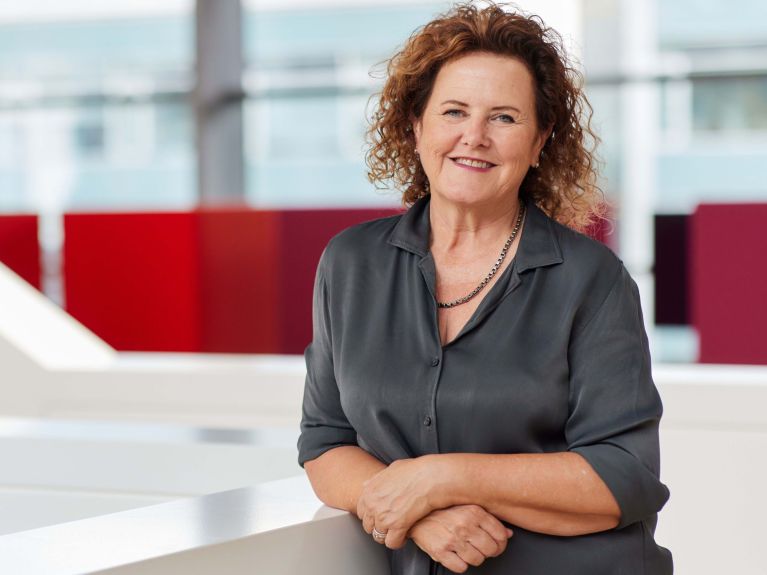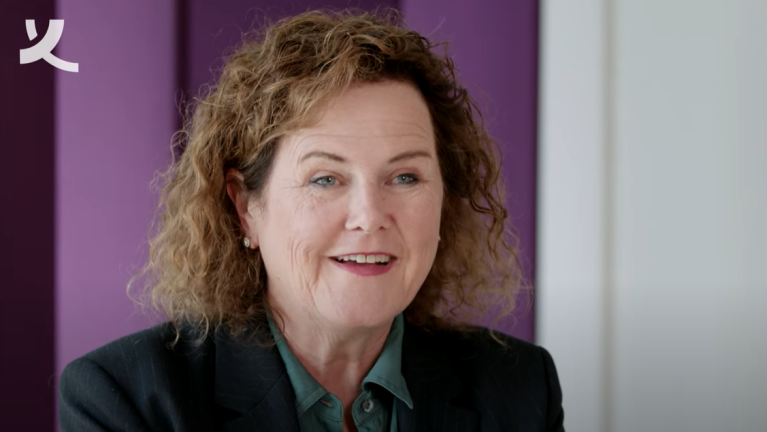A far-sighted researcher
The American scientist Erin Schuman is doing outstanding work at the Max Planck Institute for Brain Research in Frankfurt.

When we learn vocabulary or remember our most recent holiday, this involves proteins in our brain that form at the synapses between neurons. This is what the neuroscientist Erin Schuman has discovered, thereby revolutionising our understanding of how neurons function. In recognition of her work, she was awarded the Körber European Science Prize, worth one million euros, in Hamburg on 20 September 2024.
Equal opportunities for women in research
Accompanied by her French husband Gilles Laurent, likewise an eminent neuroscientist, her three school-age daughters and the family’s pets, Erin Schuman came to Germany from the United States in 2009. The two world-class scientists built up two new departments at the Max Planck Institute for Brain Research in Frankfurt am Main.
Besides her own research, Erin Schuman was keen to pursue another important goal. The institute’s new building was provided with an annex featuring a nursery, a baby changing room and a nursing room because she knew from her own experience as a scientist and mother just how difficult it can be for women in research: if they stop working for too long to care for their children they will get left behind and no longer keep pace with current research. Schuman was determined that her future colleagues would not be forced to choose between an academic career and a family. At the same time, she campaigned to increase the proportion of women in leading scientific positions.
“It has been an all-consuming task for us,” recalls Schuman. “We built a new place that is inspiring and full of energy and discovery to train people from Germany and around the world and to make new discoveries about the brain.” This is how the scientist, who was born in California in 1963 and has won numerous awards, got where she is today. Besides her scientific work, she enjoys “a relatively quiet life in Frankfurt. We have made friends in the neighbourhood and on the tennis court.” She has found it painful being separated by an ocean from her family and friends because of her job, however. As a cosmopolitan woman in the world of international science she travels a lot and particularly appreciates the fact that her institute is located in Frankfurt, a hub with excellent transport links to many other European cities.
Alongside her research and her efforts to get more women into science, she and her husband, together with other colleagues, have committed themselves to critically engaging with their institute’s history during the period of National Socialism. Two years ago, a monument to the victims of the Nazi era, designed by artists with cognitive impairments, was installed in the foyer of the building.

Dieses YouTube-Video kann in einem neuen Tab abgespielt werden
YouTube öffnenThird party content
We use YouTube to embed content that may collect data about your activity. Please review the details and accept the service to see this content.
Open consent formErin Schuman has noticed that science and innovation are generally highly valued in Germany: “One gets the sense that most German people see the importance of research and see the funding and support of science as beneficial for humanity and society.” She also highlights the outstanding skills and dedication of the technicians who, working in the background at research institutes, provide unique support to the scientists. She says that she has life-long technical staff who are exceptionally skilled and knowledgeable in her own working group. In other countries like the United States, institute staff are often less well trained, she explains. On the other hand, research structures in Germany are more hierarchical than in the US. In some cases, this may lead to some researchers “knowing their place” rather than venturing into new territories.
Even as a very young woman, she herself was interested in the unknown, which is also what motivated her to work in science. She was the first in her family to go to university. She initially studied medicine and psychology until she realised that, although she was fascinated by the brain, she wanted to focus on its micro-dimensions. She succeeded for example in demonstrating that the aforementioned proteins that form near synapses play a very important role in learning and memory. This also has practical consequences for the research and treatment of neurodegenerative disorders such as Parkinson’s and Alzheimer’s. With the Körber Prize money, the researcher wants to continue investigating disease-related changes in the proteins in the neurons and open up new treatment possibilities in medicine.

